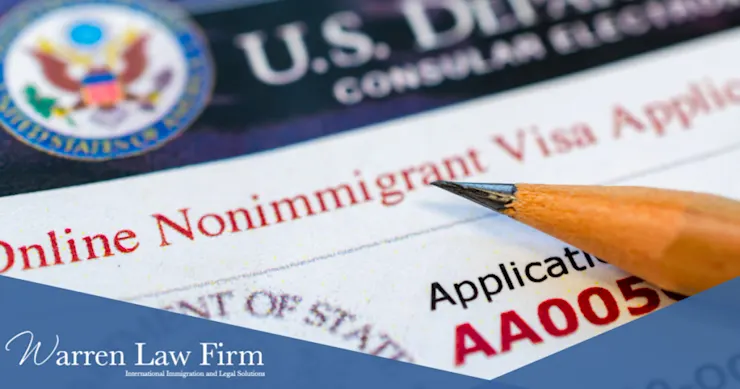E Visas for Temporary Workers
Home » Work Visas and Employment Green Cards » E Visas for Temporary Workers

If you’re like many people, you’ve heard of U.S. E visas – but what are they, and could obtaining one allow you to come to the United States to work on a temporary basis? Absolutely. However, the U.S. government must approve your visa before you can enter the country and begin work.
What is an E Visa?
E visas are work visas designated for foreign nationals of countries with which the United States has a trade agreement. If you’re a citizen of one of these countries, and you meet the eligibility requirements, you can apply for an E visa.
There are three different types of E visas: E-1, E-2 and E-3.
E-1 Visas
E-1 visas are for foreign nationals who are coming to the United States to engage in international trade. In order to qualify for an E-1 visa, you must be coming to the United States to engage in substantial trade, which is defined as trade that is international in scope, and that involves frequent transactions, involving continuous flow of goods or services.
An E-1 visa is available to qualify for Treaty Trader status – they undertake a significant amount of international trade with the United States and constitute over 50% of the trader’s trade. Although there is no minimum amount of trade, the higher the volume of trade the more likely to qualify for an E-1 visa.
This nonimmigrant classification allows a national of a treaty country to be admitted to the U.S. solely to engage in international trade on his or her own behalf. Certain employees of such a person or of a qualifying organization may also be eligible for the E-1 classification.
To qualify for a professional E-1 Visa, these requirements must be met:
- You must be a national of a country with which the United States maintains a treaty of commerce and navigation.
- You must carry on substantial trade.
- You must carry on principal trade between the U.S. and the treaty country that qualified the treaty trader for E-1 classification.
- Your items of trade include but are not limited to:
- Goods
- Transportation
- Services
- Tourism
- International banking
- Technology and its transfer
- Insurance
- Some news-gathering activities
To apply for an E-1 Visa, the Treaty Trader may file Form I-129 to request a change of status to E-1 classification. If the employee is not a Treaty Trader, the employer who is a qualifying Treaty Trader, can file the I-129 on behalf of the employee. Read more.
E-2 Visas
E-2 visas are for foreign nationals who are coming to the United States to invest a substantial amount of money in a U.S. business. In order to qualify for an E-2 visa, you must be coming to the United States to invest a substantial amount of money in a U.S. business – which is defined as an active business, in which you have invested, or are in the process of investing a substantial amount of money.
The E-2 visa is similar to an EB-5 visa except the E-2:
- Is temporary and needs to be renewed every two to five years, on average
- May only require an investment as low as $75,000 depending on the type of business for investment
- Does not need to create or save a specific number of jobs
- Investor must be actively involved in the invested business
This nonimmigrant classification allows a national of a treaty country to be admitted to the U.S. when investing a substantial amount of capital in a U.S. business. Certain employees of such a person or of a qualifying organization may also be eligible for this classification. To qualify for a professional E-2 visa, these requirements must be met:
- You must be a national of a country with which the U.S. maintains a treaty of commerce and navigation.
- You must have invested, or be actively in the process of investing, a substantial amount of capital in a bona fide enterprise in the U.S.
- You must be seeking to enter the U.S. solely to develop and direct the investment enterprise. This is established by showing at least 50% ownership of the enterprise or possession of operational control through a managerial position or other corporate device.
A request for an E-2 Visa may not be made on Form I-129 if the person being filed for is physically outside the U.S. Upon issuance of a visa, the person may then apply to a DHS immigration officer at a U.S. port of entry for admission as an E-2 nonimmigrant. Read more.
Request A Consultation
Meet The Attorney
Angela D. Warren
With more than 20 years of immigration and business immigration experience, Angela Warren has helped hundreds of individuals, families and businesses.
Main Services




Get The Immigration Help You Deserve
E-3 Visas
E-3 visas are for Australian Citizens who are coming to the United States to work in a specialty occupation. In order to qualify for an E-3 visa, you must be an Australian citizen, have a job offer from a U.S. employer, and you must be coming to the United States to work in a specialty occupation – which is defined as a profession that requires at least a bachelor’s degree (or its equivalent) for entry into the occupation.
What About Employees of Treaty Traders and Treaty Investors on E-1 and E-2 Visas?
You may qualify for E-1 or E-2 visa classification if you’re the same nationality of your main alien employer, you meet the definition of an employee, and your duties are executive or supervisory. If you’re not an executive or supervisor, you must have special qualifications. Your immigration attorney can give you further guidance.
What Are the Benefits of an E Visa?
There are many benefits of having an E visa. Some of these benefits include:
- The ability to live and work in the United States on a temporary basis
- The ability to bring your spouse and children to the United States with you
- The ability to travel in and out of the United States freely
Who’s Eligible for an E Visa?
To be eligible for an E visa, you must be a citizen of a country with which the United States has a trade agreement. Several countries currently have trade treaties with the U.S., and you can see the full list here or consult with your attorney about the most current agreements.
In order to qualify for an E visa, you must also be coming to the United States to engage in a qualifying activity – which is defined as trade (E-1 visa), investment (E-2 visa), or work in a specialty occupation (E-3 visa).
How Do You Get an E Visa?
If you meet the eligibility requirements, you or your employer can apply for an E visa by filing a petition with U.S. Citizenship and Immigration Services.
Documentation Requirements for an E Visa
When you file your petition with USCIS, you must include the following documentation:
- A completed application form: Form I-129, Petition for a Nonimmigrant Worker
- A passport photo
- Proof of citizenship, such as a copy of your passport
- Proof of your qualifying activity, such as evidence of your employment contract or offer letter, or evidence of your investment
- An application fee
Can You Family Come With You on an E Visa?
If you have an E-1, E-2, or E-3 visa, your spouse and unmarried children under the age of 21 can come with you to the United States on derivative visas (E-1D, E-2D, and E-3D visas). Your family members will be allowed to stay in the United States as long as you maintain your status, and as long as they meet all relevant requirements.
How Long Does an E Visa Last?
An E visa is valid for up to two years, and it can be renewed indefinitely as long as you maintain your status and meet all eligibility requirements.
What Happens When Your E Visa Expires?
If your E visa expires, you will have to leave the United States. If you want to stay in the United States longer than your E visa allows, you will need to apply for a different type of visa.
What Other Visas Are Available to Temporary Workers?
There are several other types of visas that may be available to temporary workers, depending on their qualifications and the nature of their work. These visas include the H-1B visa for highly skilled workers, the H-2B visa for seasonal workers, and the L-1 visa for intracompany transferees.
What Happens After Your Immigration Attorney Files a Petition For Your E-1, E-2 or E-3 Visa?
After your immigration attorney files your petition with USCIS, USCIS will review the petition to make sure that it is complete and that you meet all eligibility requirements. If your petition is approved, USCIS will send you a notice of approval, and you can then apply for a visa at a U.S. consulate or embassy.
After you have been issued a visa, you can travel to the United States and present the visa to a U.S. Customs and Border Protection officer at a port of entry. The CBP officer will then choose whether to admit you into the United States for the duration of your visa.
3 Reasons to Work With an Immigration Attorney to Get an E Visa
Here are three reasons many people choose to work with an immigration attorney to obtain a U.S. E visa:
- Attorneys know what paperwork to use – and how to fill it out.
- Lawyers are familiar with the E visa process, which means they can answer your questions every step of the way.
- Your immigration attorney can represent you if you receive an unfavorable decision on your E visa.
Here’s a closer look at each.
#1. Attorneys Know What Paperwork to Use – and How to Fill It Out
There’s a lot of paperwork associated with getting an E visa. But don’t worry – an experienced immigration attorney will know exactly which forms you need to complete and can help you fill out the forms correctly so that your application is less likely to be rejected or delayed.
#2. Lawyers Are Familiar With the E Visa Process, Which Means They Can Answer Your Questions Every Step of the Way
The E visa process can be confusing, but fortunately, an experienced immigration attorney can guide you through every step of the process and answer any questions you may have.
#3. Your Immigration Attorney Can Represent You if You Receive an Unfavorable Decision on Your E Visa
If your E visa application is denied, you may be able to appeal the decision. However, the appeals process can be complex, and it’s important to have an experienced immigration attorney on your side who can help you navigate the process and give you the best chance of success.
When Should You Hire an Immigration Attorney for Your E Visa?
You may want to consider hiring an immigration attorney if:
- You are not sure which type of E visa is right for you
- You have questions about the eligibility requirements for an E visa
- You need help filling out the required paperwork
- Your employer is asking you to get an E visa
- You have been denied a visa in the past
- You have a criminal record
- You have a complex financial situation
- You are not a native English speaker
Do You Need to Talk to an Attorney About Getting an E Visa?
The Warren Law Firm may be able to help you with your E visa. Call our office today to schedule your consultation. We can answer all your questions and help ensure that your entire process goes smoothly.

